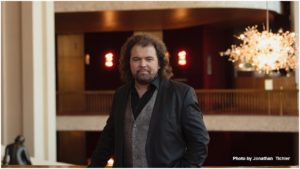
Q & A: Tenor Kristian Benedikt On ‘Samson et Dalila’ & Opera Culture Around The World
By Polina LyapustinaLithuanian tenor Kristian Benedikt made headlines last fall when he replaced Roberto Alagna in the third act of “Samson et Dalila” at the Metropolitan Opera. It was his Metropolitan Opera debut and it came months before he was officially supposed to take the stage of the legendary house.
Now he is ready for his official debut where he will perform Samson in the final performance of the Spring run.
A leading tenor in numerous European houses in Russia, and his native Lithuania, Benedikt has already made his mark in major roles and has become one of today’s rising stars.
Benedikt recently spoke to OperaWire about his career and the excitement about returning to the Met for his official debut.
OperaWire: You’ve already performed Samson in Saint-Petersburg, Torino, Beijing, and obviously, know the character. Who is Samson for to you?
Kristian Benedikt: I see him from the third perspective. He is one of mankind. A symbol. His fight is more than we see. As with everyone of us, he has to deal with the temporary and with the eternal. Every day we decide if we are brave enough to stand for eternal values, or we have the courage to rush into the abyss of temporary pleasures.
It starts in childhood when we learn to spend our time to learn, to discover, to get stronger, smarter, instead of just watching cartoons or playing with friends. It’s not that interesting, but better. And if we can keep ourselves on this path all our life, we win. If not — here is a story of Samson.
And what we have at the end of this story — I also see it deeper. It is not just an act of revenge, but his last will — to step back onto the path of good, to pay his price, and destroy evil. And that’s how he won: by breaking with the vice, destroying something bigger than a human (a temple), breaking through the limits, circumstances which exist for every man. And this fight is the most important for me in Samson.
OW: Is it important for you to take a role personal?
KB: Not every role is so deep, not so connected to me personally. Otello, Samson, Herman — these are very personal for me.
But I also perform characters like Calaf and what you need there is to believe in this fairytale and to be a little miracle yourself. I don’t really use my own experience to be convincing as Calaf. In fact, I even try to be myself less.
It’s the same situation with Wagner — his images and his philosophy are extraordinary, but do not reflect any part of me, so I try not to destroy the character with my personality.
And there’s the third type of roles, which are not mine. It’s not that they are bad. Some characters like Rodolfo are ones that I could never imagine myself singing, even when I was younger.
And I cannot believe anyone would enjoy a singer fighting himself on a stage for the role’s sake.
OW: Tell us about your work with Sir Mark Elder?
KB: He is very accurate and precise with the score. When with coaches, we got used to separating “Alas” from other words in a line vocally. However, he noticed that in the score there’s a legato. So it’s really nothing to discuss for him since the composer was French and would never write it this way if it’s not correct. So we changed how we approached it.
Sir Mark Elder is all finding those details and he’s very positive and supportive. With him, everyone feels comfortable immediately. We know that we can do it. With his amazing experience and very precise approach, he’s sensitive to our personal vocal characteristics, and he knows how to help you use your instrument.
He also makes no difference if you’re famous or not. When there were some problems during the premiere in September, we had a one-on-one rehearsal and we felt comfortable with each other immediately. He made me feel that I was ready to help in case of further issues, but moreover, that we were ready to put on a great performance in March. So both of us are very looking forward to it.
He’s a great psychologist and a friend. I saw him talking to singers before the performances. This is what a true leader should be. I remember him talking to me before I had to jump into the third act. And then, on stage I couldn’t see him because of my make-up. I couldn’t see anyone, even a prompter. So this absolute trust I felt for him led me during that performance.
OW: This winter in Lithuania you’ve taken on a wide range of repertoire, singing Don Jose, Pinkerton, Herman, and Calaf in less than two months. Can you talk about jumping from role to role?
KB: This happens sometimes. And it’s not that easy, but I took on the challenge and I’m happy that everything worked out. “Carmen” and “Butterfly” are in my ordinary repertoire for Lithuanian National Opera, and then I was going to devote myself to preparation for Robert Wilson’s “Turandot.”
But suddenly Vilnius City Opera lost their Herman, and I’d just received confirmation that I would be singing in “Queen of Spades” at the Met next season, so I jus said “Why not?” I had rehearsals for both performances everyday, literally running across the street from the National Opera to the Congress Hall.
It’s good that both roles are for spinto tenor, so I could make it at the same time without threatening my voice. With “Queen of Spades,” we just decided to try and make the best of it. Because we are all friends — director Dalia Ibelhauptaitė, Asmik Grigorian, Kostas Smoriginas, and I – it was fun. And once it started to sound good, we realized that we were on the right track and worked really hard.
OW: How different is that from your work in the international stage?
KB: It’s very important to remember who you are in your heart and with your voice no matter how many contracts I have abroad. Of course, I’m happy and proud to sing at the Met, and I always appreciate singing in Vienna, Beijing, Budapest, London, Saint-Petersburg. I always find new perspectives and important details when working with every team and conductor. This is priceless.
For me, working abroad is very inspiring. Being in New York this autumn I was working on different roles: Radamès, Dick Johnson, and Samson. I was full of energy and wanted to use it to improve myself. It’s very easy to sit and wait for good offers or coaches to prepare the role. But to be honest, homework is the most important for a singer. Your progress is on you.
OW: How different is the approach in different opera houses?
KB: I enjoy the feeling of being a part of the strong opera culture. Maybe not of an opera house, but more likely of a country.
America has this more personal style and at the same time, more complex. Everything is important, you should pay attention to every detail.
In Russia, you need to work hard, and those who handle it, they are real stars. After three seasons in Mariinsky theatre, I have so much respect for them, which is not possible to overestimate.
And I like the Italian approach so much. I was working with Gianfranco Cecchele for last 10 years and what I learned about technique, melody, and about acting with voice is amazing. At the same time, Italians think about saving voice more than others. It’s a gift, and you should take care of it.
One tenor, who learned from great Arturo di Giuseppe Melocchi, said to me after my Italian debut as Otello in Modena: “The conductor said that you were singing in full voice at the rehearsals. Stop it. Once your voice leaves you, it never comes back. Never miss the opportunity to remain silent.”
OW: You’re also releasing your first CD this month. What audiences can expect from it?
KB: The idea came five years ago when my agent suggested that I record a solo CD. I wanted to do a program of my favorite arias I have done on stage. I chose works from “Samson et Dalila,” “Otello,” “Pagliacci,” “Andrea Chénier,” “La Juive,” and “Die Walküre.” I also chose the Lithuanian aria “Udrio Daina” and the Russian piece “Life is but a game.” I enjoy singing these beautiful languages and I wanted to show my versatility.
We recorded it with Lithuanian National Philharmonic and conductor Modestas Pitrenas. It was a pleasure to work with them and I have never felt so comfortable before. We had just a few days but found the right tone from the very beginning and once we finished, we started to think about another project. We’re looking forward to doing it, but at this point it’s a secret.



